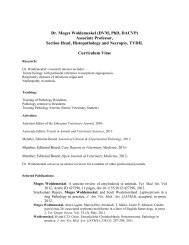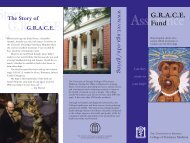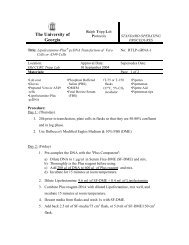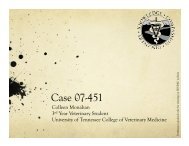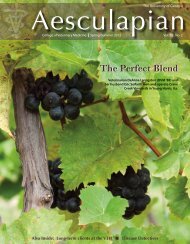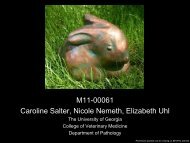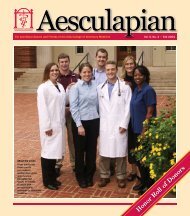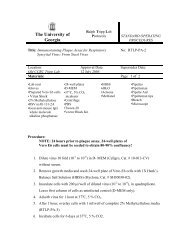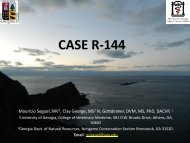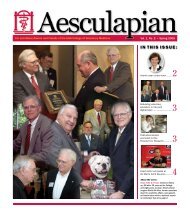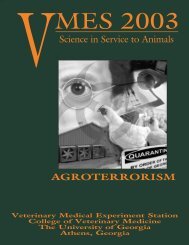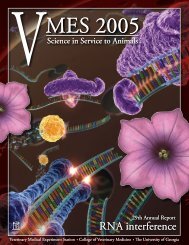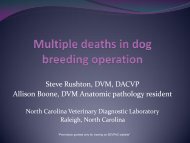Winter/Spring 2011 Aesculapian magazine - University of Georgia ...
Winter/Spring 2011 Aesculapian magazine - University of Georgia ...
Winter/Spring 2011 Aesculapian magazine - University of Georgia ...
You also want an ePaper? Increase the reach of your titles
YUMPU automatically turns print PDFs into web optimized ePapers that Google loves.
The Veterinary Corps is currently<br />
composed <strong>of</strong> some several hundred<br />
veterinarians, including a number <strong>of</strong><br />
men and women who graduated from<br />
the <strong>University</strong> <strong>of</strong> <strong>Georgia</strong> College <strong>of</strong><br />
Veterinary Medicine. Here are a few <strong>of</strong><br />
their stories:<br />
Dr. Tim Loonam (DVM ’00)<br />
said the military helped him early on<br />
by awarding scholarships for both his<br />
undergraduate and veterinary school<br />
years. Dr. Loonam, whose experience<br />
as a member <strong>of</strong> the veterinary<br />
corps began in Fort Jackson, S.C.,<br />
emphasized the crucial public health<br />
efforts for which the veterinary corps is<br />
responsible: “Basically any food, water<br />
or drink being consumed by anyone in<br />
the military or their families on base<br />
is from sources approved by the U.S.<br />
Army Veterinary Corps,” he said. “The<br />
veterinary corps has this mission for the<br />
entire U.S. Department <strong>of</strong> Defense.”<br />
The veterinary corps was also on the<br />
forefront <strong>of</strong> efforts to monitor the<br />
West Nile virus, said Dr. Loonam, who<br />
recalled participating in the “… initial<br />
testing and surveillance programs in<br />
South Carolina….”<br />
During the Iraq invasion, Dr.<br />
Loonam was reassigned to lead a<br />
veterinary squad <strong>of</strong> the 248th Medical<br />
Detachment out <strong>of</strong> Ft. Bragg, N.C.<br />
“The 248th is the only airborne<br />
veterinary unit in the world, and<br />
supports airborne, special operations<br />
and other combat units around<br />
the world,” he said. During his 13<br />
months in Iraq, Dr. Loonam traveled<br />
extensively throughout the country<br />
working with military dog teams and<br />
the food safety mission. The second<br />
half <strong>of</strong> his tour provided unique, albeit<br />
dangerous, experiences primarily in<br />
Al Anbar Province, which he referred<br />
to as “The Wild West.” While in<br />
Dr. Katie Carr performs a dental prophylaxis on a military working dog at a veterinary facility<br />
on Kadena Air Force Base in Okinawa, Japan. Photo courtesy <strong>of</strong> Dr. Katie Carr.<br />
Al Anbar, Dr. Loonam helped with<br />
the early stages <strong>of</strong> reestablishing<br />
the <strong>University</strong> <strong>of</strong> Baghdad College<br />
<strong>of</strong> Veterinary Medicine. He also<br />
encountered Saddam Hussein’s lions<br />
and vaccinated endangered Iraqi jungle<br />
cats against rabies, which, he said,<br />
was a significant problem among feral<br />
animals in the region. Dr. Loonam<br />
said he was glad the experience left<br />
him unscathed, as he later learned the<br />
jungle cats are extremely dangerous<br />
and unpredictable.<br />
Dr. Loonam also found himself<br />
in an unusual role for a veterinarian:<br />
“One <strong>of</strong> the most bizarre twists was<br />
being assigned with the Alpha Surgical<br />
Company, a U.S. Navy Field Hospital<br />
at Al Asad Air Base during the battles<br />
<strong>of</strong> Fallujah,” he said. “Because <strong>of</strong><br />
the shortages <strong>of</strong> medical staff with<br />
that surgical company, I was assigned<br />
as triage <strong>of</strong>ficer when the wounded<br />
Marines and Iraqis arrived by<br />
ambulance and helicopter.”<br />
Dr. Loonam currently holds the<br />
rank <strong>of</strong> lieutenant colonel, and is now<br />
home working in his private practice in<br />
South Carolina. He is hopeful his son,<br />
Jack, will be attending UGA in the fall<br />
<strong>of</strong> <strong>2011</strong>.<br />
Lt. Col. Robert Randall<br />
Thompson (DVM ’86) launched his<br />
career in the U.S. Army Veterinary<br />
Corps in 1990 when he left a small<br />
animal practice to volunteer to serve<br />
in the corps during the Gulf War.<br />
Recognized worldwide as an expert<br />
in military working dog surgery,<br />
Dr. Thompson’s career experiences<br />
are a testament to the flexibility <strong>of</strong><br />
knowledge that is routinely required<br />
<strong>of</strong> a military veterinarian. He<br />
has: provided emergency care to<br />
government-owned marine mammals;<br />
been a rabies consultant for military<br />
bases and military hospitals; cared for<br />
livestock in underdeveloped nations;<br />
<strong>Aesculapian</strong> • <strong>Winter</strong>/<strong>Spring</strong> <strong>2011</strong><br />
9



